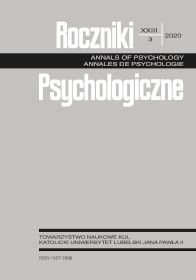Introduction to the Special Issue on Research Trends in Polish Work and Organizational Psychology
Bibliografia
Anvari, F., & Lakens, D. (2018). The replicability crisis and public trust in psychological science. Comprehensive Results in Social Psychology, 3(3), 266–286.
Bamberg, S. (2003). How does environmental concern influence specific environmentally related behaviors? A new answer to an old question. Journal of Environmental Psychology, 23(1), 21–32.
Bargh, J. A., Gollwitzer, P. M., & Oettingen, G. (2010). Motivation. In S. Fiske, D. Gilbert, & G. Lindzey (Eds.), Handbook of Social Psychology (5th ed., pp. 268–316). Wiley.
Bargh, J. A., Gollwitzer, P. M., Lee-Chai, A., Barndollar, K., & Trötschel, R. (2001). The automated will: Nonconscious activation and pursuit of behavioral goals. Journal of Personality and Social Psychology, 81, 1014–1027.
Basińska, B. A. (2020). Work motivation profiles and work performance in a group of corporate employees: A two-step cluster analysis. Roczniki Psychologiczne, 23(3), 227–245.
Bersoff, D. M. (1999). Explaining unethical behaviour among people motivated to act prosocially. Journal of Moral Education, 28(4), 413–428.
Brown, A. L., Zimmerman, R. D., & Johnson, E. C. (2005). Consequences of individuals’ fit at work: A meta-analysis of person–job, person–organization, person–group, and person–leader fit. Personnel Psychology, 58(2), 281–342.
Chang, K., & Smithikrai, C. (2010). Counterproductive behaviour at work: An investigation into reduction strategies. The International Journal of Human Resource Management, 21(8), 1272–1288.
Czarnota-Bojarska, J. (2010). Dopasowanie człowiek-organizacja i tożsamość organizacyjna [Person–organisation fit and organizational identity]. Scholar.
Deci, E. L., & Ryan, R. M. (2008). Self-determination theory: A macrotheory of human motivation, development, and health. Canadian Psychology/Psychologie Canadienne, 49(3), 182–185.
Fishbach, A., Friedman, R. S., & Kruglanski, A. W. (2003). Leading us not into temptation: Momentary allurements elicit overriding goal activation. Journal of Personality and Social Psychology, 84(2), 296.
Gagné, M., & Deci, E. L. (2005). Self‐determination theory and work motivation. Journal of Organizational Behavior, 26(4), 331–362.
In‐Sue, O., Russell, P. G., Kwanghyun, K., Crystal M. H., Jong‐Hyun, L., Chang‐Goo, H., & Kang‐Hyun, S. (2014). Fit happens globally: A meta‐analytic comparison of the relationships of person–environment fit dimensions with work attitudes and performance across East Asia, Europe, and North America. Personnel Psychology, 67(1), 99–152.
Kahneman, D., & Tversky, A. (1982). On the study of statistical intuitions. Cognition, 11(2), 123–141.
Korulczyk, T. (2016). Person-supervisor fit, retention and job performance (Unpublished doctoral dissertation). John Paul II Catholic University of Lublin, Poland.
Kowalik, S. (2008). Review of the book Psychologia – między teorią, metodą i praktyką, by Jerzy Brzeziński (ed.). Roczniki Psychologiczne, 11(1), 179–181.
Kristof, A. L. (1996). Person‐organization fit: An integrative review of its conceptualizations, measurement, and implications. Personnel Psychology, 49(1), 1–49.
Latham, G. P. (2020). The credibility of goal priming research in work and organizational psychology. Roczniki Psychologiczne, 23(3), 213–226.
Ohly, S., & Fritz, C. (2007). Challenging the status quo: What motivates proactive behaviour? Journal of Occupational and Organizational Psychology, 80(4), 623–629.
Paliga, M., Pollak, A., & Kożusznik, B. (2020). Tactics of influence and deinfluentization, personality, and the personal sense of power among polish managers. Roczniki Psychologiczne, 23(3), 267–290.
Papies, E. K. (2016). Goal priming as a situated intervention tool. Current Opinion in Psychology, 12, 12–16.
Robinson, S. L., & Morrison, E. W. (1995). Psychological contracts and OCB: The effect of unfulfilled obligations on civic virtue behavior. Journal of Organizational Behavior, 16(3), 289–298.
Rożnowski, B. (2020). Are professional burnout and work engagement opposing or independent constructs? Roczniki Psychologiczne, 23(3), 291–307.
Świątkowski, W., & Dompnier, B. (2017). Replicability crisis in social psychology: Looking at the past to find new pathways for the future. International Review of Social Psychology, 30(1), 111–124.
Korulczyk, T., & Cooper-Thomas, H. D. (2020). Person-supervisor fit and proactive behaviour and unethical behaviours. Roczniki Psychologiczne, 23(3), 247–307.
Copyright (c) 2020 Roczniki Psychologiczne

Utwór dostępny jest na licencji Creative Commons Uznanie autorstwa – Użycie niekomercyjne – Bez utworów zależnych 4.0 Międzynarodowe.


